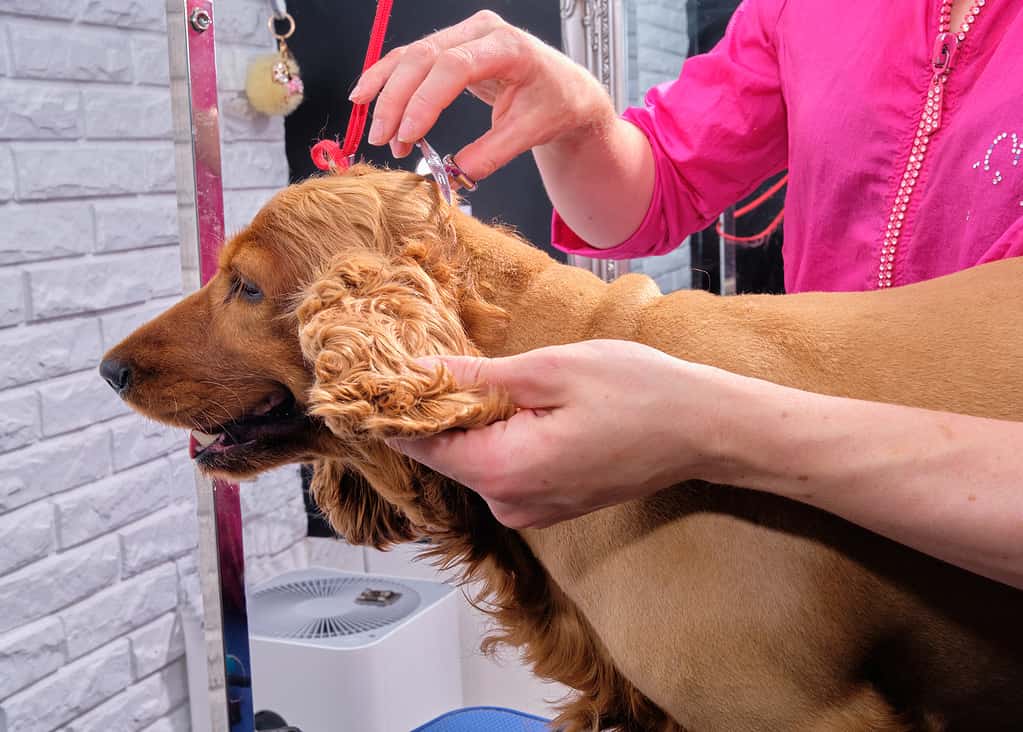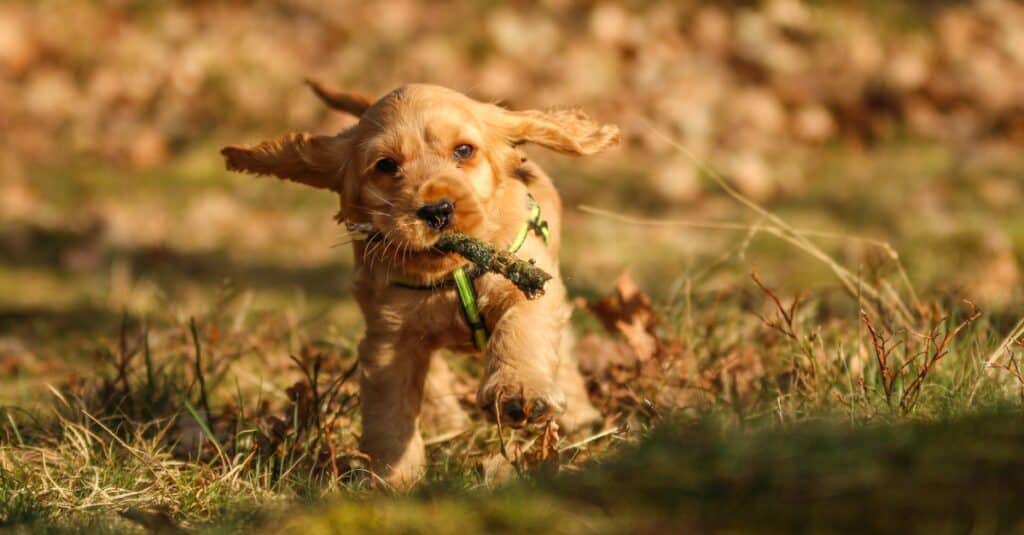Common complaints about cocker spaniels include that they shed too much, their coats mat easily, they bark excessively, they chew things they shouldn’t, and they can’t be left alone. Some people dislike the amount of daily exercise they require. Cockers have strong prey drives and might catch small animals in the yard.
In this article, we’ll discuss these complaints and more, for a total of nine common complaints about cocker spaniels! We’ll also talk about how you can resolve some common behavioral issues in the breed.
Are Cocker Spaniels Good Dogs?

Cocker spaniels aren’t right for everyone, but might be a perfect fit for you.
©Erik Lam/Shutterstock.com
Cocker spaniels can be excellent dogs for the right person! The breed is generally healthy and long-lived with an average lifespan of 10-14 years.
They’re energetic, affectionate, and friendly. They’re typically good with other dogs and children, though slow introductions are necessary for any breed, and children and dogs should never be left unsupervised.
Of course, there are also faults to the breed, which is true for any dog! Cocker spaniels need regular grooming and shed year-round. Separation anxiety is common in the breed, as are associated behaviors such as barking and chewing. They’re also very prey-driven and prone to a few genetic health problems.
Overall, whether or not a cocker spaniel is right for you will depend on your family, lifestyle, and what you want in your next dog.
Complaints about Cocker Spaniels
#1: Cocker Spaniels Shed

Cocker spaniels will shed on your blankets and furniture.
©New Africa/Shutterstock.com
Cocker spaniels shed moderately year-round, so you’ll be vacuuming up fur and your lint roller will become your best friend! They have double coats that shed more profusely in the spring and fall.
#2: They Need Weekly Grooming

Cocker spaniels need to be brushed regularly to prevent matting.
©Ihar Halavach/iStock via Getty Images
You’ll need to brush your dog at least once a week. According to the American Kennel Club, these sessions should never be skipped, as mats will build up in the fur. Matting hurts your dog and can cause skin problems like bruising or infection.
During shedding season in the spring and autumn, you may need to brush your pup several times a week to keep their coat healthy.
While some long-haired dogs can be shaved to make grooming easier, this isn’t recommended for double-coated breeds like cocker spaniels. Shaving can damage their coats, making them more prone to getting cold, developing heat stroke, or being sunburnt, amongst other problems.
#3: Untrained, Bored, or Anxious Cocker Spaniels may Bark Excessively

Without enough exercise, your cocker spaniel may bark excessively or develop other behavioral problems.
©Aneta Jungerova/Shutterstock.com
Excessive barking is a common complaint about cocker spaniels and occurs for several reasons. First, it’s vital that your dog is getting enough exercise, as cocker spaniels are high-energy dogs. Mental stimulation is equally important.
Without enough movement or things to do, your dog may become anxious or bored. Both can lead to them barking when they shouldn’t.
If you don’t spend enough time with your dog, they may also resort to barking out of frustration, anxiety, or loneliness. Cocker spaniels aren’t suited to being left alone for long periods, and are prone to separation anxiety.
Lastly, if all of their needs are met, it’s time to look at training. Some cocker spaniels will bark excessively at others outside the window. Teaching a “quiet” cue can help greatly!
#4: Destructive Chewing is Common in the Breed

Tired dogs are also less likely to chew, which is another common behavioral problem in the breed.
©Angela Holmyard/Shutterstock.com
Another common complaint people may have about their cocker spaniels is destructive chewing. This is common in many breeds and is typically a sign of stress–especially after the teething stage, where chewing is very normal.
Cocker spaniels may chew things they shouldn’t because they’re not getting enough exercise or mental stimulation, because they have separation anxiety, or due to poor training.
Please remember to avoid harsh punishments, and instead use force-free training techniques. This includes setting your dog up for success by not leaving them unattended with things they might chew within reach.
#5: They Can’t be Left Alone for Long

Cocker spaniels are prone to separation anxiety and may prefer to accompany you on outings when possible.
©Benevolente82/Shutterstock.com
As you may have already gathered, cocker spaniels don’t do well when left alone for long periods. They’re best for families where someone is home most of the day.
Many cocker spaniels develop separation or isolation anxiety, meaning they either become anxious when away from a specific person or when they’re completely alone.
This can make leaving even for short periods stressful on the humans, and excruciating for the dog. Slow desensitization is the best way to solve these anxieties, but they require someone to be home with the dog constantly until the training progresses, which isn’t realistic for most people.
#6: They Need Plenty of Daily Exercise

Cocker spaniels require daily movement to stay in shape.
©Andrea Izzotti/Shutterstock.com
As a sporting breed, cocker spaniels need lots of physical activity. They enjoy long daily walks and playtime at home. Ideally, you should have a large yard where you can play games like fetch, tug, or chasing a flirt pole.
Even with a large yard, however, your cocker spaniel won’t exercise themselves. They require an active caretaker to play and walk alongside them.
#7: They Have Strong Prey Drives

Cocker spaniels were bred to hunt and still retain those instincts today.
©WilleeCole Photography/Shutterstock.com
Initially bred as hunting dogs, cocker spaniels have high prey drives. If you don’t want a dog who will chase (and maybe catch!) squirrels, rabbits, or birds in the backyard, this breed isn’t for you. They’re very likely to chase small animals, which may also include pet cats.
Keep your cocker spaniel on a leash or enclosed in a fenced yard at all times. You shouldn’t rely on their recall, as they’re likely to run off if they catch the scent of prey or see something moving down the street.
#8: They May be Difficult to Potty Train

Puppies and even adult dogs may face potty training troubles.
©iStock.com/undefined undefined
Some people report potty training difficulties with their cocker spaniels, including nervous or excited peeing, not wanting to go outside in bad weather, and general training problems.
Cocker spaniels should be trained the same as other dog breeds: bring them outside frequently (every two hours in the beginning) and stay outside until they potty. Watch them carefully indoors and keep them nearby at all times, so they can’t wander off and pee when you aren’t looking.
If your cocker spaniel dislikes especially hot, cold, or wet weather, you may want to look into indoor potty training. Puppy pee pads or a grass patch (real or fake) are good options for teaching them to go in one, easy-to-clean place.
#9: Cocker Spaniels are Prone to Health Problems

Cocker spaniels are prone to a few genetic health problems.
©Antonio_Diaz/iStock via Getty Images
Cocker spaniels are prone to a few genetic health problems, but overall this is a fairly healthy breed. Things to watch for include:
- Eye conditions
- Ear infections
- Hip dysplasia
- Luxating patella
A reputable breeder will complete recommended health tests for both parents and should provide CHIC numbers so that you can view the results yourself. Turn away from any breeder who doesn’t provide this information, or if health tests are outdated.
To ensure you’re ready for the costs of caring for a cocker spaniel, you should have either a large savings account for vet bills (including emergencies, which can be very pricey!) or pet insurance.
When it comes down to it, families who are home often and have time to groom and exercise their dog regularly likely can’t go wrong with a cocker spaniel! For those who work full-time with no one to care for their dog while they’re away, who don’t want to exercise their dog daily, or who don’t want to comb a long coat, you might want to choose another breed!
The photo featured at the top of this post is © Yuriy Kozak/Shutterstock.com
Ready to discover the top 10 cutest dog breeds in the entire world?
How about the fastest dogs, the largest dogs and those that are -- quite frankly -- just the kindest dogs on the planet? Each day, AZ Animals sends out lists just like this to our thousands of email subscribers. And the best part? It's FREE. Join today by entering your email below.
Thank you for reading! Have some feedback for us? Contact the AZ Animals editorial team.







